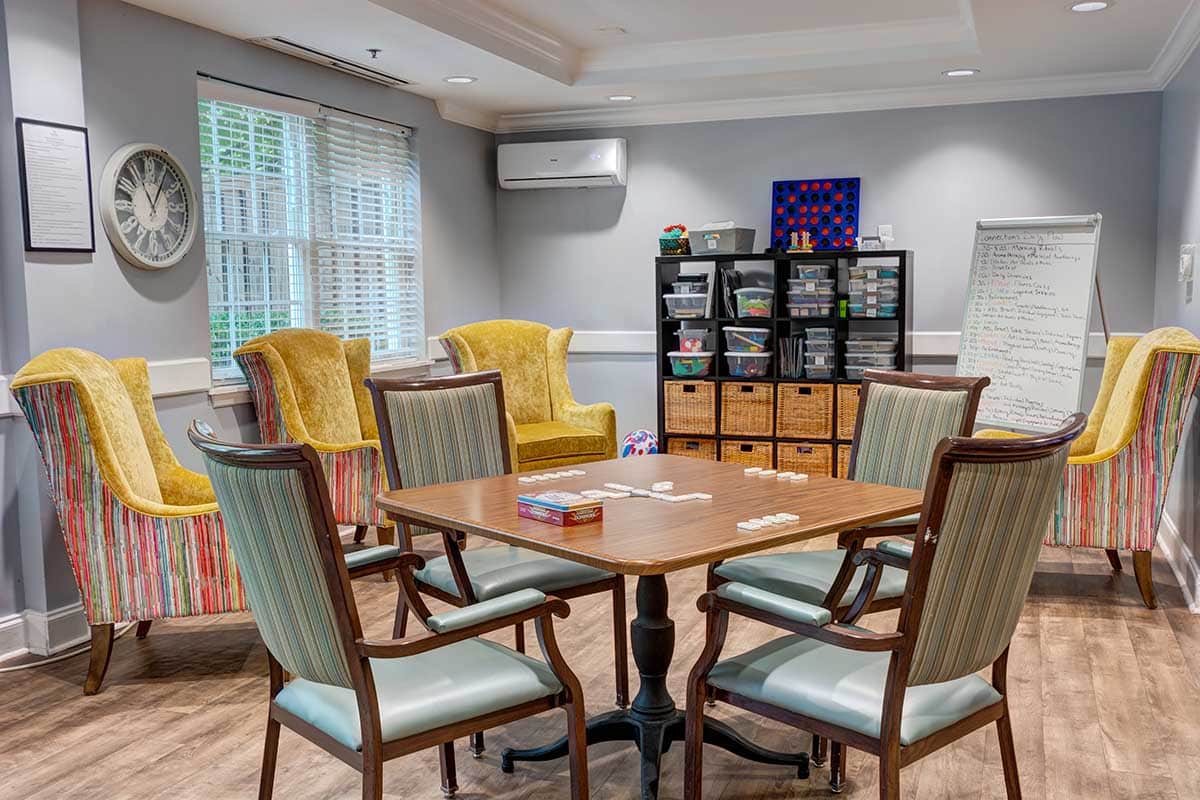Boutique Memory Care Environments That Support and Comfort
Boutique Memory Care Environments That Support and Comfort
Blog Article
Everything About Memory Care Services: Why Small Memory Care Houses Are a Fantastic Choice
Memory care services play a necessary role in sustaining people with Alzheimer's and dementia. Tiny memory treatment homes stick out for their customized approach and intimate setup. With lower staff-to-resident proportions, these homes promote more powerful links and tailored treatment. Locals gain from boosted social communications and a secure setting. As households check out choices, comprehending the distinct advantages of tiny memory care homes comes to be crucial. What elements should be considered when picking the best home?
Recognizing Memory Care Provider
While numerous might be familiar with basic senior care alternatives, understanding memory care solutions is necessary for families encountering the difficulties of cognitive decline. Memory treatment particularly accommodates individuals with problems such as Alzheimer's condition and other forms of mental deterioration. These services give a structured setting that concentrates on boosting the lifestyle for homeowners through specialized care and support.Memory care centers are created to assure security and safety, typically including protected settings to avoid straying. Educated personnel members are readily available all the time to aid with daily activities, medicine administration, and individual treatment. In addition, memory treatment programs typically consist of cognitive excitement tasks, customized to engage locals and promote psychological well-being. Families can take advantage of comprehending these solutions, as they enable notified decisions concerning their loved ones' care, guaranteeing that their specific requirements and choices are addressed in a supportive and thoughtful fashion.
The Benefits of Tiny Memory Care Homes
Small memory care homes offer distinct advantages that can significantly improve the lifestyle for locals with cognitive problems. One substantial advantage is the intimate setting, which permits individualized communications amongst personnel and residents. This smaller sized setup promotes meaningful relationships, minimizing feelings of isolation and anxiousness typically experienced by individuals with memory issues.Additionally, the lower staff-to-resident proportion in little memory care homes enables caregivers to give even more mindful supervision and support. This strategy not only enhances safety and security yet likewise advertises a feeling of protection for the residents.Moreover, little memory care homes can adjust rapidly to the distinct needs and preferences of each homeowner, permitting for an extra homey ambience. Such an atmosphere can encourage social involvement and involvement in tasks, ultimately enriching the daily experiences of those dealing with cognitive problems.
Personalized Care Plans for Homeowners
Customized treatment strategies are important in memory treatment homes, as they deal with the special needs and choices of each resident. These plans start with detailed evaluations performed by proficient experts, who examine cognitive abilities, case history, and personal passions. This tailored strategy assurances that care is not just efficient but additionally considerate of each individual's self-respect and autonomy.Moreover, personalized treatment strategies are flexible, permitting changes as locals' demands advance over time. This versatility cultivates a complacency and knowledge, which is vital for people coping with memory obstacles. Caretakers are educated to implement these plans continually, providing support that aligns with the citizens' regimens and preferences.Ultimately, individualized treatment strategies enhance the lifestyle for locals by advertising involvement, wellness, and freedom, making them an essential facet of memory treatment services in small memory treatment homes.
Developing a Home-Like Environment
Producing a home-like atmosphere is essential for promoting convenience and knowledge in memory treatment setups, as it significantly affects citizens' psychological well-being. Small memory treatment homes typically prioritize customized touches, such as cozy shade combinations, family members pictures, and acquainted furniture setups, which help homeowners feel extra comfortable. Incorporating components similar to a conventional home, like comfortable home and communal locations, encourages a sense of belonging.Moreover, using all-natural light and outside areas can enhance the ambience, promoting relaxation and harmony. Team member play a considerable function in preserving this setting by involving with citizens in a caring manner, treating them like family. Regular tasks, such as food preparation or gardening, can additionally add to a home-like feel, using opportunities for homeowners to take part in meaningful experiences. Generally, producing a supporting atmosphere supports cognitive feature and emotional stability, making it an essential aspect of memory care services.
Improved Social Communication and Neighborhood
Boosted social communication and area are crucial elements of memory treatment services. By cultivating personalized social engagement and creating a family-like environment, these services advertise significant connections amongst homeowners. Team tasks and events even more encourage participation, helping people feel much more included and sustained.
Customized Social Interaction
While social communication is vital for overall well-being, lots of people with memory impairments usually battle to engage meaningfully with others. Personalized social engagement in memory treatment homes addresses this difficulty by producing customized activities that accommodate citizens' special rate of interests and abilities. By concentrating on specific choices, caretakers can promote links that reverberate deeply with everyone. Activities such as art therapy, music sessions, and guided conversations promote cognitive stimulation and psychological expression. Furthermore, tiny group setups urge friendship and permit even more intimate communications, improving sensations of belonging. This approach not just fights sensations of seclusion yet additionally encourages citizens to preserve a feeling of identity, inevitably adding to improved mental health and quality of life.
Family-like Atmosphere
In a memory treatment setting, cultivating a family-like ambience greatly enhances social interaction and constructs a feeling of neighborhood among homeowners. Smaller memory care homes typically prioritize intimate atmospheres, allowing citizens to form closer links with one an additional and team participants. This nurturing atmosphere promotes trust, which is necessary for individuals with memory impairments. Citizens are more probable to engage in discussions and share experiences, creating an encouraging network that relieves sensations of isolation. The knowledge of shared rooms and regimens adds to a feeling of belonging, additionally urging social interaction (personalized memory care). In such setups, psychological bonds grow, leading to enhanced total wellness and a better of life for citizens as they navigate their everyday experiences together
Team Activities and Events

Safety And Security and Protection Features in Tiny Homes
Numerous little homes designed for memory care include necessary safety and safety attributes to assure the health of locals. These homes usually use safe entry and leave indicate prevent roaming, an usual problem among individuals with memory disabilities. In addition, surveillance systems and alarm system devices enhance monitoring, you could look here ensuring that staff can without delay reply to any uncommon activities.Interior formats are customized for safety, with decreased threats such as sharp edges and clutter-free paths. Handrails and non-slip flooring are typically mounted to lower the risk of falls. Employee are trained in emergency situation protocols, ensuring they are prepared for different situations.Moreover, personalized care strategies may consist of assessment of individual security needs, supplying customized remedies for each and every citizen. In general, these safety and security and safety and security attributes create a caring atmosphere where residents can flourish while keeping their self-respect and self-reliance.
How to Choose the Right Memory Treatment Home
Exactly how can families guarantee they select one of the most suitable memory treatment home for their liked ones? The choice calls for cautious consideration of several factors. Initially, households need to assess the facility's personnel certifications and training, guaranteeing that caretakers are experienced in handling memory-related conditions. Next, it's crucial to examine the home's setting, concentrating on security functions and whether it promotes a sense of neighborhood and belonging. Visiting the facility can provide understanding into everyday tasks and the social environment, which are essential for mental excitement and psychological health. In addition, families ought to ask about the care plans supplied, ensuring they are customized to specific demands. Lastly, considering the home's area and ease of access for family sees can add to a smoother change. By addressing these elements, households can make an informed decision that prioritizes their liked one's comfort and lifestyle in a memory treatment setting.
Regularly Asked Questions
What Qualifications Should Staff Members in Memory Treatment Residences Have?
Team participants in memory treatment homes ought to have relevant qualifications, experience in dementia treatment, strong interaction abilities, and concern. Ongoing training in behavior management and healing interventions improves their capacity to sustain citizens effectively.
How Do Memory Treatment Services Differ From Typical Assisted Living?
Memory care services concentrate particularly on people with memory problems, providing specific assistance and structured settings. In contrast, standard assisted living offers basic More about the author aid with everyday activities, lacking the tailored technique necessary for those with cognitive obstacles.
What Sorts of Tasks Are Offered in Memory Care Residences?
Memory care homes typically use a variety of tasks designed to engage citizens. Typical alternatives include art therapy, music sessions, cognitive video games, exercises, gardening, and get-togethers, all targeted at enhancing well-being and cognitive function.
Can Homeowners Bring Their Own Possessions to Memory Care Homes?
Citizens can generally bring their own possessions to memory care homes, allowing them to personalize their home - personalized memory care. This method aids produce an acquainted atmosphere, advertising convenience and a sense of identification for the people

Exactly How Are Relative Involved in the Care Refine?
Family participants play an essential duty in the treatment procedure, usually taking part in decision-making, attending care meetings, and supplying emotional support. Their participation fosters a collective atmosphere, boosting the local's general health and lifestyle. While several may be familiar with basic senior care alternatives, understanding memory care services is important for family members dealing with the obstacles of cognitive decline. These services offer an organized environment that concentrates on enhancing the high quality of life for homeowners with specialized treatment and support.Memory treatment facilities are created to ensure safety and security and security, commonly including safeguarded environments to prevent roaming. Customized care plans are important in memory care homes, as they provide to the unique needs and choices of each citizen. Personnel participants in memory care homes need to possess pertinent accreditations, experience in mental deterioration treatment, solid interaction skills, and empathy. Memory care services concentrate especially on individuals with memory problems, offering customized support and organized atmospheres.
Report this page